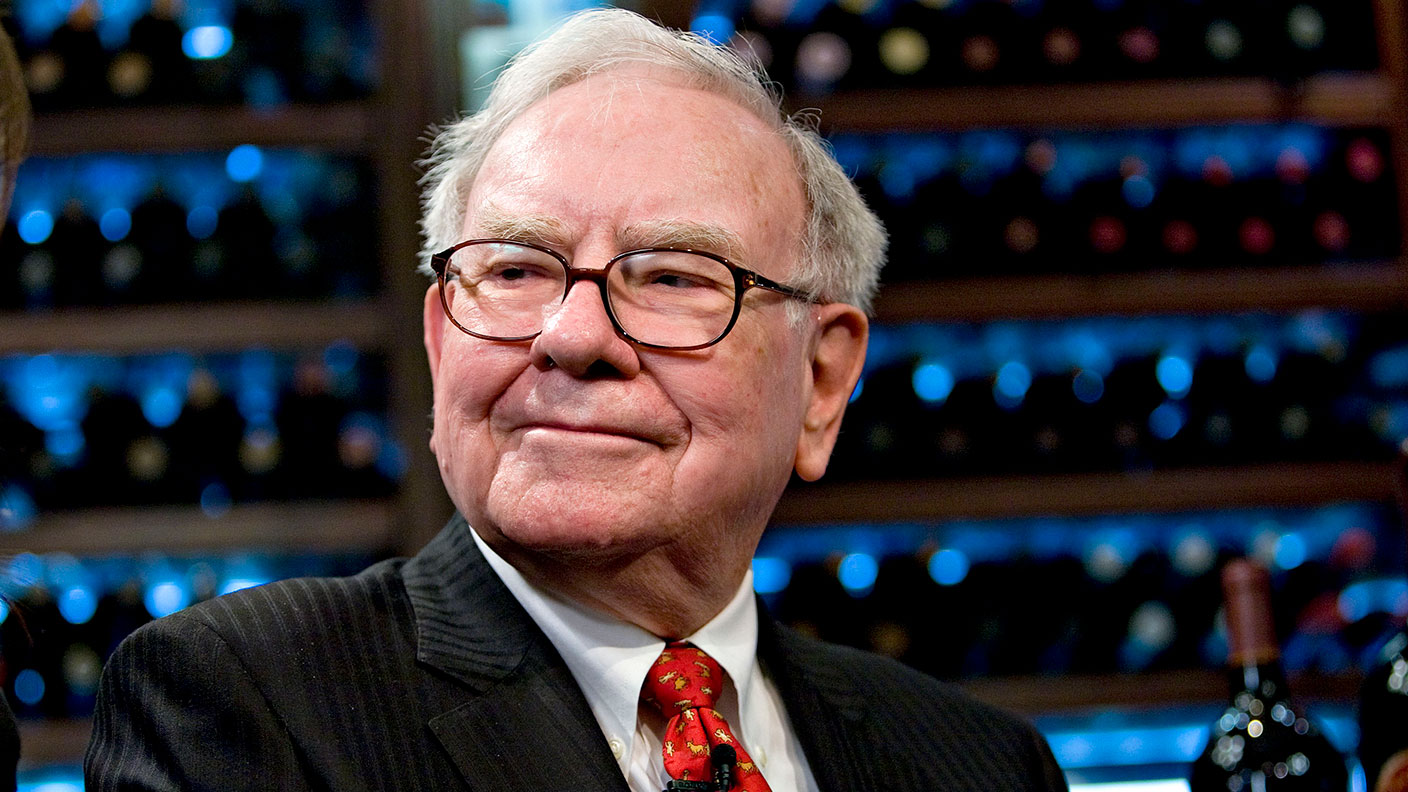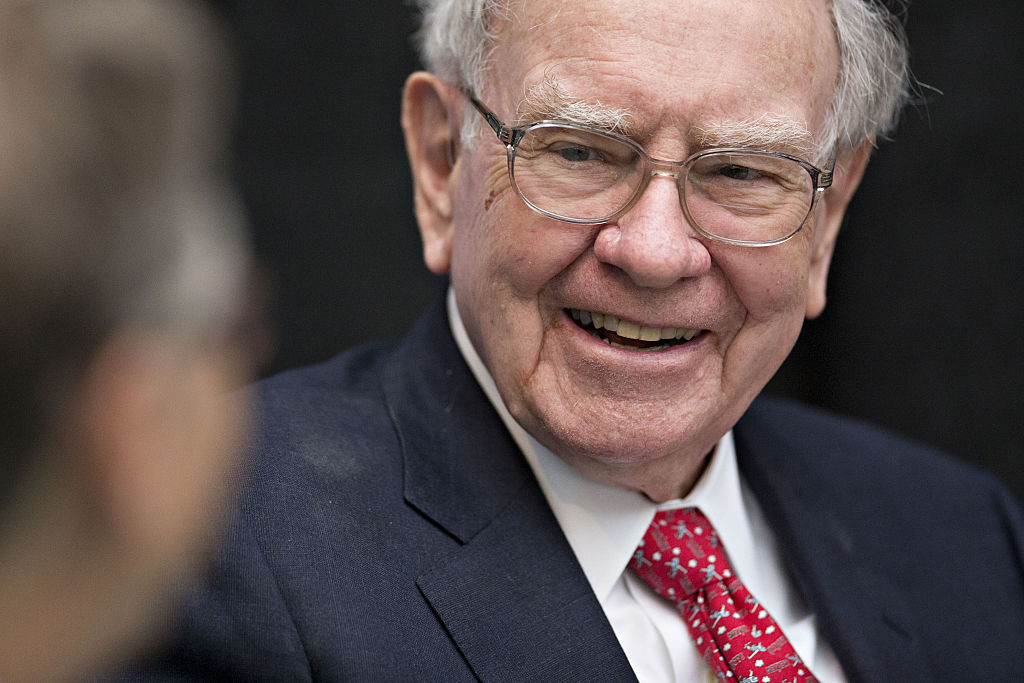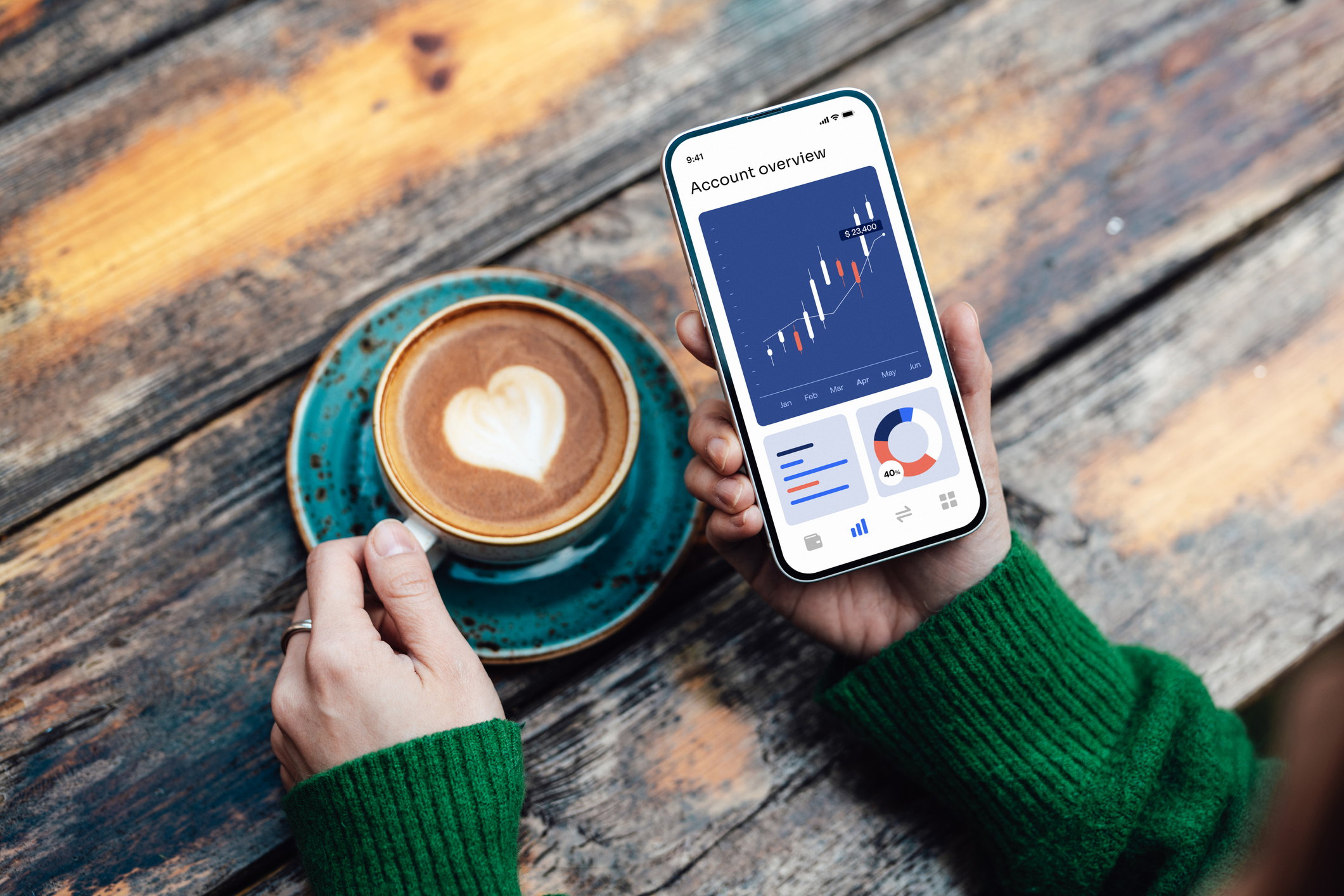How Warren Buffett built his fortune
Warren Buffett is considered by many to be the best investor of all time. We examine how much Buffett is worth and how he made his fortune.


Get the latest financial news, insights and expert analysis from our award-winning MoneyWeek team, to help you understand what really matters when it comes to your finances.
You are now subscribed
Your newsletter sign-up was successful
Want to add more newsletters?

Twice daily
MoneyWeek
Get the latest financial news, insights and expert analysis from our award-winning MoneyWeek team, to help you understand what really matters when it comes to your finances.

Four times a week
Look After My Bills
Sign up to our free money-saving newsletter, filled with the latest news and expert advice to help you find the best tips and deals for managing your bills. Start saving today!
Warren Buffett is considered by many to be the best investor of all time. When he set out on his own in the mid-1950s, investors entrusted him with just $100,000 (around $1m today) of their capital. Over the course of the past 70 years, he has grown this capital into a conglomerate with just under $1trn of assets.
Buffett started investing when he was 11 years old, buying six shares of Cities Service preferred stock (three shares for himself and three for his sister) at a cost of $38 per share. He made a small profit on this investment and went on to build several other businesses.
He filed his first tax return at just 13 years of age. It was for the 1944 calendar year. He’d earned $592.50 in total, more than half of it from a paper round, the rest from investments. (He paid $7 in tax). The young businessman attended the University of Nebraska before moving to Columbia University, where he met his mentor, professor Benjamin Graham.
Graham essentially wrote the book on value investing and he also managed his own investment firm, which the young Buffett joined when he left university. Unfortunately, Graham wound up the venture a few years after the young entrepreneur joined and he was soon back home in Omaha. Soon afterwards, a group of family and friends asked Buffett to invest their savings in the stockmarket. The Buffett Partnerships, as they came to be known, earned a 31.6% annual return before fees from 1957 to 1968 compared to 9.1% for the Dow Jones Industrial Average. Buffett used a similar investment strategy to the one pioneered by Graham.
MoneyWeek
Subscribe to MoneyWeek today and get your first six magazine issues absolutely FREE

Sign up to Money Morning
Don't miss the latest investment and personal finances news, market analysis, plus money-saving tips with our free twice-daily newsletter
Don't miss the latest investment and personal finances news, market analysis, plus money-saving tips with our free twice-daily newsletter
The Warren Buffett portfolio and the rise of Berkshire Hathaway
Buffett started buying shares in Berkshire Hathaway for his partners’ portfolios in the early 1960s. At the time, Berkshire was a struggling textile business. Its peers had a much lower cost base so they could undercut the firm on price. As losses mounted, the corporation’s market value fell below the value of the assets on its balance sheet.
The investor wanted Berkshire to start closing its manufacturing facilities and return the cash to its shareholders, which would have produced a fat, risk-free return for all of its shareholders. However, Berskhire’s management declined to follow his plan – so Buffett decided to take control of the business himself.
Buffett used Berkshire’s capital to buy up other firms, mainly companies in the insurance sector. In 1967, he bought Omaha-based insurer National Indemnity Company for $8.6m, giving him his first foothold in the industry. Not only was National Indemnity a well-run profitable insurer, but it also owned an investment portfolio, a valuable source of capital.
Today Berkshire Hathaway owns more than 60 subsidiaries, employing more than 300,000 people. It owns insurer Geico, battery maker Duracell, restaurant chain Dairy Queen, BNSF, one of the largest railroads in the US, and a utility giant, Berkshire Hathaway Energy – that’s all alongside a $300bn portfolio of equities.
Warren Buffett’s net wealth exceeds $100bn
At the same time, Buffett has built a huge fortune for himself. He is one of the richest people in the world (the exact position fluctuates but he’s generally in the top five) with a net worth of $112bn.
Virtually all of Warren Buffett’s net wealth is tied up in Berkshire Hathaway stock. Since he gained control of the business in 1965, the shares have returned 20.1% per annum compared to 10.5% for the S&P 500.
The top stocks in Warren Buffett’s portfolio
Buffett’s investing style can be defined by one of his best-known quotes, “Rule no. 1: Never lose money. Rule no. 2: Never forget rule one.”
Since the 1950s, the investor has always sought to find investment opportunities with a low chance of failure, but high return potential. Buffett seeks to minimise the risk of failure by sticking to companies in sectors that he knows well. “Risk comes from not knowing what you are doing,” as he puts it. He likes to own companies with an enduring competitive advantage, such as a well-known brand or substantial economies of scale, and will not pay over the odds for any business. As a value investor, he prefers to buy when other investors are selling.
In 2008 when the global financial sector was teetering on the edge of collapse, Buffett invested $5bn of Berkshire’s cash in Goldman Sachs, at extremely favourable terms which would have been impossible for an ordinary investor to access. The bet eventually yielded a profit of more than $3bn for the conglomerate. Around the same time he also ploughed cash into Dow Chemical, Bank of America and General Electric.
Despite this impressive bet, Buffett generally does not try to time the market or speculate on the price of securities. He believes that investors should approach buying a stock with the same mindset as if they were buying the entire business. He has encouraged others to “own your stocks as an investment – just like you’d own an apartment, house or a farm – look at them as a business.”
Here are the top 20 equity holdings in Berkshire Hathaway’s equity portfolio (which is managed by Buffett) as reported at the end of March according to the firm’s 13F regulatory filing:
| Company | Symbol | Holdings | Value | % of portfolio |
| Apple Inc | AAPL | 911,347,617 | $155,564,138,000.00 | 42.79% |
| Bank of America Corp | BAC | 1,032,852,006 | $41,636,348,000.00 | 11.45% |
| American Express Company | AXP | 151,610,700 | $28,351,201,000.00 | 7.80% |
| Chevron Corporation | CVX | 159,178,117 | $25,918,973,000.00 | 7.13% |
| Coca-Cola Co | KO | 400,000,000 | $24,799,999,000.00 | 6.82% |
| Kraft Heinz Co | KHC | 325,634,818 | $12,826,755,000.00 | 3.53% |
| Moody’s Corporation | MCO | 24,669,778 | $8,323,829,000.00 | 2.29% |
| Occidental Petroleum Corporation | OXY | 143,162,392 | $7,737,804,000.00 | 2.13% |
| US Bancorp | USB | 144,046,330 | $6,719,111,000.00 | 1.85% |
| Activision Blizzard, Inc. | ATVI | 74,187,400 | $5,152,292,000.00 | 1.42% |
| Davita Inc | DVA | 36,095,570 | $4,082,770,000.00 | 1.12% |
| HP Inc | HPQ | 121,092,418 | $3,792,480,000.00 | 1.04% |
| Bank of New York Mellon Corp | BK | 74,346,864 | $3,591,100,000.00 | 0.99% |
| Kroger Co | KR | 57,985,263 | $3,326,615,000.00 | 0.92% |
| Citigroup Inc | C | 55,244,797 | $2,945,319,000.00 | 0.81% |
| Verisign, Inc. | VRSN | 12,815,613 | $2,850,961,000.00 | 0.78% |
| General Motors Company | GM | 62,045,847 | $2,713,886,000.00 | 0.75% |
| Paramount Global Class B | PARA | 68,947,760 | $2,606,915,000.00 | 0.72% |
| Itochu Corporation | ITOCF | 81,304,200 | $2,330,991,414.00 | 0.64% |
| Charter Communications Inc | CHTR | 3,828,941 | $2,088,764,000.00 | 0.57% |
| Liberty Sirius XM Group Series C | LSXMK | 43,208,291 | $1,975,915,000.00 | 0.54% |
| Visa Inc | V | 8,297,460 | $1,840,128,000.00 | 0.51% |
| Amazon.com, Inc. | AMZN | 533,300 | $1,738,531,000.00 | 0.48% |
| Aon PLC | AON | 4,396,000 | $1,431,470,000.00 | 0.39% |
| Mastercard Inc | MA | 3,986,648 | $1,424,748,000.00 | 0.39% |
| Snowflake Inc | SNOW | 6,125,376 | $1,403,507,000.00 | 0.39% |
| Celanese Corporation | CE | 7,880,998 | $1,125,958,000.00 | 0.31% |
| Liberty Sirius XM Group Series A | LSXMA | 20,207,680 | $923,692,000.00 | 0.25% |
| McKesson Corporation | MCK | 2,921,975 | $894,504,000.00 | 0.25% |
| Nu Holdings Ltd | NU | 107,118,784 | $826,957,000.00 | 0.23% |
| RH | RH | 2,170,000 | $707,615,000.00 | 0.19% |
| T-Mobile Us Inc | TMUS | 5,242,000 | $672,811,000.00 | 0.19% |
| Globe Life Inc | GL | 6,353,727 | $639,185,000.00 | 0.18% |
| Markel Corporation | MKL | 424,343 | $620,034,000.00 | 0.17% |
| Liberty Media Formula One Series C | FWONK | 7,722,451 | $539,336,000.00 | 0.15% |
| Store Capital Corp | STOR | 14,754,811 | $431,283,000.00 | 0.12% |
| Ally Financial Inc | ALLY | 8,969,420 | $389,990,000.00 | 0.11% |
| Floor & Decor Holdings Inc | FND | 4,780,000 | $387,180,000.00 | 0.11% |
| StoneCo Ltd | STNE | 10,695,448 | $125,137,000.00 | 0.03% |
| Verizon Communications Inc. | VZ | 1,380,111 | $70,303,000.00 | 0.02% |
| Marsh & McLennan Companies, Inc. | MMC | 404,911 | $69,005,000.00 | 0.02% |
| Royalty Pharma plc | RPRX | 1,496,372 | $58,299,000.00 | 0.02% |
| Johnson & Johnson | JNJ | 327,100 | $57,972,000.00 | 0.02% |
| Procter & Gamble Co | PG | 315,400 | $48,193,000.00 | 0.01% |
| Diageo plc | DEO | 227,750 | $41,650,920.00 | 0.01% |
| Mondelez International Inc | MDLZ | 578,000 | $36,287,000.00 | 0.01% |
| Liberty Latin America Ltd Class A | LILA | 2,630,792 | $25,518,000.00 | 0.01% |
| Vanguard 500 Index Fund ETF | VOO | 43,000 | $17,852,000.00 | 0.00% |
| SPDR S&P 500 ETF Trust | SPY | 39,400 | $17,795,000.00 | 0.00% |
| United Parcel Service, Inc. | UPS | 59,400 | $12,739,000.00 | 0.00% |
| Liberty Latin America Ltd Class C | LILAK | 1,284,020 | $12,314,000.00 | 0.00% |
Get the latest financial news, insights and expert analysis from our award-winning MoneyWeek team, to help you understand what really matters when it comes to your finances.

Rupert is the former deputy digital editor of MoneyWeek. He's an active investor and has always been fascinated by the world of business and investing. His style has been heavily influenced by US investors Warren Buffett and Philip Carret. He is always looking for high-quality growth opportunities trading at a reasonable price, preferring cash generative businesses with strong balance sheets over blue-sky growth stocks.
Rupert has written for many UK and international publications including the Motley Fool, Gurufocus and ValueWalk, aimed at a range of readers; from the first timers to experienced high-net-worth individuals. Rupert has also founded and managed several businesses, including the New York-based hedge fund newsletter, Hidden Value Stocks. He has written over 20 ebooks and appeared as an expert commentator on the BBC World Service.
-
 How a ‘great view’ from your home can boost its value by 35%
How a ‘great view’ from your home can boost its value by 35%A house that comes with a picturesque backdrop could add tens of thousands of pounds to its asking price – but how does each region compare?
-
 What is a care fees annuity and how much does it cost?
What is a care fees annuity and how much does it cost?How we will be cared for in our later years – and how much we are willing to pay for it – are conversations best had as early as possible. One option to cover the cost is a care fees annuity. We look at the pros and cons.
-
 The Stella Show is still on the road – can Stella Li keep it that way?
The Stella Show is still on the road – can Stella Li keep it that way?Stella Li is the globe-trotting ambassador for Chinese electric-car company BYD, which has grown into a world leader. Can she keep the motor running?
-
 Investing in the energy sector – is the reward worth the risks?
Investing in the energy sector – is the reward worth the risks?The energy sector used to offer predictable returns, but now you need to tread carefully. Is the risk worth it?
-
 How to beat Warren Buffett – and the fund and trusts that have managed it
How to beat Warren Buffett – and the fund and trusts that have managed itWarren Buffett has achieved stellar returns for investors over a long and illustrious career. Can you rival his investment performance?
-
 Fractional shares: what are they and why HMRC is worried?
Fractional shares: what are they and why HMRC is worried?Investors who have flocked to investment apps offering fractional shares in an Isa could lose the tax-free status of their portfolios.
-
 Halifax: House price slump continues as prices slide for the sixth consecutive month
Halifax: House price slump continues as prices slide for the sixth consecutive monthUK house prices fell again in September as buyers returned, but the slowdown was not as fast as anticipated, latest Halifax data shows. Where are house prices falling the most?
-
 Rents hit a record high - but is the opportunity for buy-to-let investors still strong?
Rents hit a record high - but is the opportunity for buy-to-let investors still strong?UK rent prices have hit a record high with the average hitting over £1,200 a month says Rightmove. Are there still opportunities in buy-to-let?
-
 Pension savers turn to gold investments
Pension savers turn to gold investmentsInvestors are racing to buy gold to protect their pensions from a stock market correction and high inflation, experts say
-
 8 ways to profit from Japan’s recovery
8 ways to profit from Japan’s recoveryCorporate reform, normalising monetary policy and cheap valuations make Japanese equities a top long-term bet, says Alex Rankine.